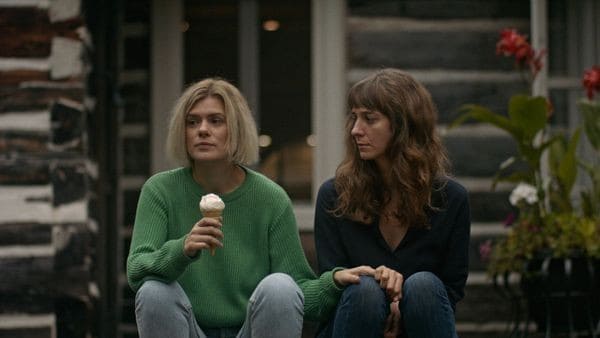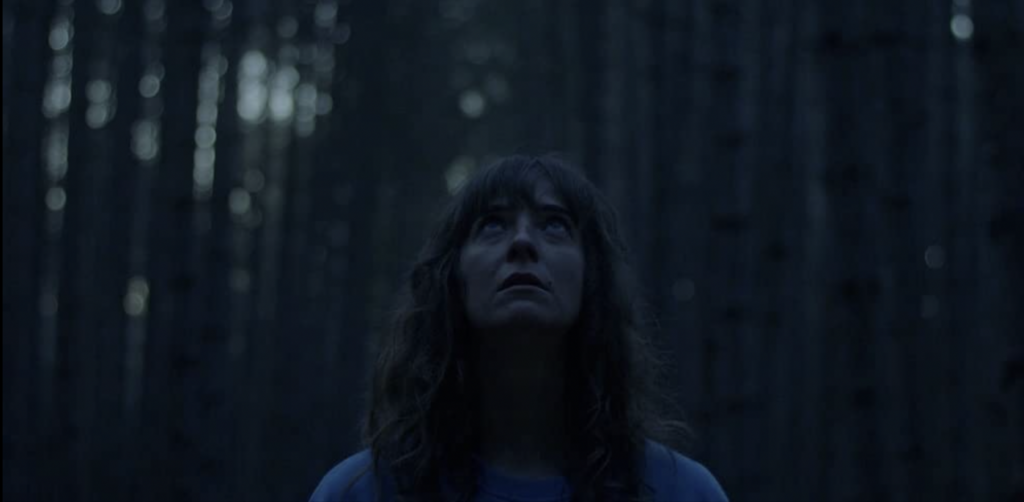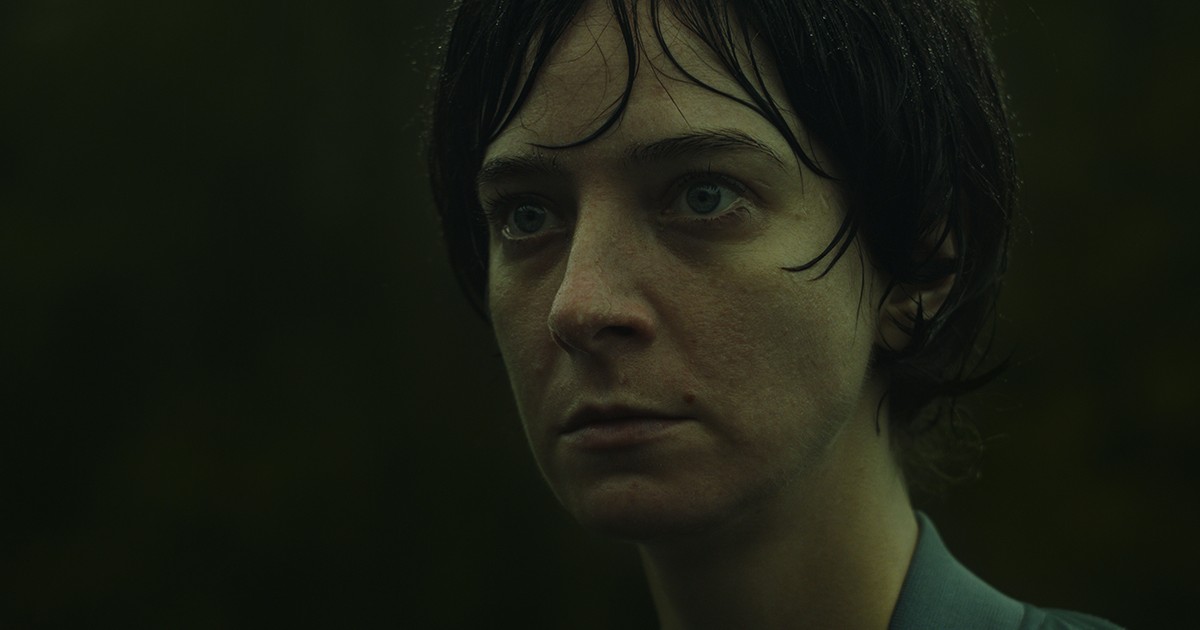The debut film from directors Madeleine Sims-Fewer and Dusty Machinelli is the yin to Promising Young Woman’s yang, forgoing brightly colored nails and witty quips for slow-burning, white-knuckled tension.

Violation begins with Londoners Miriam (Sims-Fewer) and her husband Caleb (Obi Abili) visiting Miriam’s sister Greta (Anna Maguire) and Greta’s husband Dylan (Jesse LaVercombe) deep in the woods in rural Canada. Tension is immediately evident not only between Miriam and her husband but also between Miriam and the younger sister she’s made the journey to see. One night, as the bonfire the group had been enjoying slowly dies, after half of the party has retired to their beds, Miriam is raped. The next day, she works up the courage to tell Greta; instead of being met with love and support, Miriam finds herself disbelieved and insulted, accused of intentionally interfering in her sister’s life. The narrative is relayed out of sequence, with flashbacks interspersed among scenes of Miriam on a present-day course of violent retribution. Violation is not an enjoyable movie but rather a grueling 107 minutes experienced alongside a traumatized woman.
**Reading any further means you will read spoilers!**
The film is prefaced with a warning that it will depict sexual violence, but no information about when it will come or who is involved. Little happens during the first 40 minutes of the film, but the knowledge that something terrible is coming creates an oppressive atmosphere of foreboding and anxiety. We see Miriam avenge herself before we see her violated, and she does so brutally, if clinically; the rape scene, when it finally comes, is not violent in the way media has taught to expect rape to be. Instead, Sims-Fewer and Machinelli opt to show rape as many women really experience it: suffered quietly, under confusing circumstances, at the manipulative hands of someone we know.
The small cast is excellent. Sims-Fewer’s performance as Miriam is particularly outstanding; the deep emotion she shows on screen feels raw and real. The way she sobs and curls in on herself after she kills Dylan, the vomiting and gagging as she butchers him like a farm animal, and the panic attack she has in the motel are powerfully portrayed and communicate Miriam’s human suffering as she commits inhuman (or perhaps excessively human) acts. The depth of Miriam’s emotion stands in stark contrast to the shallowness of Dylan’s. When Miriam confronts him the day after the rape, he pushes the guilt and shame he should feel onto her, insinuating that she is trying to twist a consensual encounter in order to absolve herself of having cheated. In the film’s present, a year after the rape, he has rewritten it completely. Miriam seduces him, luring him into a position of vulnerability, but she questions him as she does so, asking what he remembers about the night he assaulted her. It is almost as if she is giving him a chance to admit his guilt. Instead, he recounts a story in which her protests have become moans of pleasure and her attempts to push him away are remembered as her gripping him with desire. It’s a gut-twisting reminder of the way men justify their treatment of women and of their blatant and willful ignorance of the violence they commit.
The film frames the choices Miriam makes in the pursuit of vengeance with predator–prey symbolism, including heavy-handed images of a wolf eviscerating a rabbit that ultimately distract from the rest of the film. More effective are the scenes in which we learn more about the interpersonal relationships between the characters, especially the sisters’ history. Miriam, we learn, was the bigger personality of the two, taking it upon herself to defend her little sister whether Greta asked her to or not. Miriam is a vegetarian; Greta was too, but began eating meat during the course of her relationship with Dylan. Was her vegetarianism a younger sibling’s desire to emulate an admired older one? Or peer pressure? Dylan believes it was the latter, taking a few jabs at Miriam about his wife no longer being “under her thumb.” With Dylan, Greta not only eats meat but has even begun hunting and butchering animals. One night, while skinning a rabbit, she explains that the first time she did it, she was nearly sick. She pushed through her revulsion, however, realizing that it was a liberating feeling to not be reliant on someone else. Even without the rabbit-and-wolf imagery, the connection between this conversation and Dylan’s murder would be impossible to miss. Miriam must be self-reliant; she is alone. The sisters’ estrangement, Caleb’s absence, the lone-wolf symbolism, and the vast emptiness of the Canadian wilderness all emphasize that Miriam has no one to turn to for protection but herself. Miriam has become a predator to provide retribution for herself (unlike Greta, Miriam does vomit while butchering her prey).

Miriam’s isolation during the latter portion of the narrative has another impact—she is nearly silent. Everything we know about her we have learned through her interactions with other people. We have some sense, from her conversations with Dylan and Greta the day after, and even from her drunken argument with Caleb immediately afterward, of her immediate response to being raped. How she has processed it over the course of the following year, how and why she has plotted her revenge, even exactly how her marriage ended—all of this is opaque. The audience, as a result, can only guess at her exact motives in opting for such grisly vengeance. We wonder whether we should really be rooting for her, whether this a disproportionate response, whether perhaps her grief is turning her into something we wish it weren’t. They’re uncomfortable questions to be asking; Miriam doesn’t owe Dylan an explanation, but we almost wish for an expository monologue for our own sake. Perhaps this is the point—these difficult questions demand to be asked. In an interview with Michael Gingold from Rue Morgue, Sims-Fewer revealed that she wasn’t originally meant to play the role of Miriam. When it was first presented as an option to her, she struggled to see Miriam as something other than the villain.
Violation was released within months of the widely praised Promising Young Woman, at the end of 2020. Both are riffs on the old rape-and-revenge subgenre of exploitation film, but one would be hard pressed to find many other similarities between the two. Promising Young Woman is, despite its subject matter, a fun watch—a plot-focused Technicolor saga of righteous, stylish vengeance that wraps up its unambiguous message with a pretty bow. Violation is, emotionally and thematically, far more challenging, an extreme examination of grief and emotional turmoil in the wake of rape. For all that Promising Young Woman is approachable and fun, Miriam’s dark anguish is infinitely more real and relatable than the girlbossy fantasy Cassie represents. Promising Young Woman wants its heroine to be badass, yet still highly feminine—a woman who is underestimated because of the way she presents herself—but the result is unrealistic and improbable. Violation’s directors scrupulously avoid presenting female rage as something sexy, leaving the film’s focus squarely on Miriam’s emotions and motives.

Violation is not a perfect film. There are pieces of the narrative and aspects of the characters that could be better fleshed out and further explained; there are mood-setting images of wilderness and wildlife that take up space unnecessarily. But what it does well, it does particularly well. The difficulties of a close but fraught personal relationship fractured by sexual violence and the disorienting, painful effects of said violence are expertly shown. Violation ends with the viewer wondering whether Miriam and her sister can ever mend their relationship. Given what Miriam has done to her sister’s husband, it seems unlikely—even though we get the sense that Miriam’s retribution may have been the only way for her to move on with her relationship with her sister. Violation is certainly a revenge film, but not a conventional one. By the end, one may wonder whom Miriam is really seeking revenge on and what the cost of that revenge will be.

